
The unwritten social contract in China since the 1989 Tiananmen Square massacre has been a simple one; if you don’t threaten the regime’s political authority then it will permit you to make money. The Maoist fervour of old has long since been discredited and cynicism has taken its place. Making money becomes a tool of social control and a way to keep China’s vast population placid. Of course, not everybody will be able to avail of the opportunities provided in the semi-capitalist free-for-all that is China at the moment – but that’s not the point. As long as there is a widespread perception that there is money to be made and things will get better that is enough to keep the lid on social discontent and prevent most people from thinking too deeply about the inequalities of the system under which they live. Now, this model is breaking down. Recession/Depression in the rest of the world means that the Chinese can’t sell as much of their stuff, ultimately resulting in redundancies and unemployment. The real fear for China’s communist leadership is a groundswell of jobless, discontented and angry people venting their frustration on their authoritarian rulers. Just like the emperors of old, if the Chinese communist party fails to uphold their end of the bargain and the dream of economic prosperity fades, then they will have lost the Mandate of Heaven. Turmoil would inevitably follow.

The post-Tiananmen massacre consensus, while laying the foundations for much of China’s economic expansion during the past two decades, has produced some unpalatable side-effects. For a start, if the ruling party’s legitimacy and right to rule is based on claims of economic prosperity then everything will be sacrificed in the name of keeping the growth rates high so that they can claim continued success. As China’s manufacturing base grew from a relatively low level in the late 1980s to the boom of the late 2000s (when it was manufacturing much of the rest of the world’s stuff), these high growth statistics and numbers were relatively easy to maintain. Labour was cheap. Foreigners had an insatiable appetite for manufactured objects (and cheap credit to pay for it). Lots of money flowed in and most everybody in China felt happy and said what a great job the leadership was doing.

But now, the limits of this policy have been reached. With downturn in the rest of the world, less Chinese exports are being sold and the illusion of ever-continuing economic prosperity has come under severe threat; an issue that may result in profound social and political consequences. The other area where this policy has had a profound impact upon is the environment. This relentless pursuit of manufacturing growth has meant that corners have been cut in relation to pollution and the disposal of hazardous waste in the name of short-term political and economic gain. Cynicism and moral bankruptcy amongst the Chinese political and business elite has meant that opportunities for corruption and personal enrichment have greased the wheels of environmental degradation and created untold long-term problems.

Dalian, the subject of this self-published book by Portuguese photographer Filipe Casaca, is a Northern Chinese city that was one of the early beneficiaries of the 1980s policy of creating Special Economic Zones to entice foreign investment into China in the aftermath of the Maoist nightmare. As such, it can be regarded as one of the early prototypes for the export-oriented model that now underpins the China’s existence as we know it. It is also a place where nineteenth century incursions by foreign colonial powers (and their wars) over who got to control China were played out. As such it has a deep historical resonance, being a site where Western ideas of industrial capitalism and the weight of Chinese history came together to produce this hybrid product of globalisation (millennia old traditions of authoritarian rule coexist alongside an almost Victorian mania for industrial production at any cost). The title of the work stems from an English translation of a former name of the city, but serves as an apt metaphor for what the past twenty years of frantic economic development have been built upon.

The obvious ravages of pollution and other scars left in the pursuit of short-term economic progress remain hidden from view in this book. Instead, Casaca concentrates on the city, a place where the profits and migrants unleashed by this narrow and tightly controlled form of social engineering have been poured into. Casaca’s portrayal of Dalian is a confusing cacophony of concrete, strange structures (a spiky shelter of some sort and a pair of concrete horses), and the surreal (a burning dust-cart) which operate to disorient the viewer, echoing the dislocation and trauma that Chinese society has undergone over the past number of decades. As well as the blue colour cast that operates as a key to the narrative structure, the lack of a horizon in many of the landscape images enhances this mood of ominous darkness. The accompanying short story by Mingyu Wu, which speaks of the sudden “heaviness” that descended on a city’s people, echoes the themes explored within the visual narrative. Dalian is Blade Runner brought to life.

The mood is also enhanced through the portrait images. Here, we see isolated individuals trapped in this artificial space, a status shared by the zoo animals he also pictures. The animals depicted also resonate with traditional symbolism and demonstrate that despite all the concrete and Starbucks that has filled China’s urban centres, these are a thin veneer over a much more enduring culture. Yet, the cultural hybridisation produced by globalisation is never far away; a quote from the Book of Revelations at the beginning of the book provides a Western reading of these images. Casaca plays with the intersection of these two cultures and produces a sophisticated, multi-layered visual narrative that engages with cultural difference whilst getting his point across.

Although the people of Casaca’s images are depicted basking in the consumerist glories of this artificial paradise (an aquarium, roller blading, enjoying the pleasures of the beach), the bleakness remains. Material possessions cannot compensate for the sacrifices and losses inflicted upon a society still reeling from a century of traumatic change and an uncertain future. The final, strong image of a young woman in a white dress lying on the beach serves as a powerful metaphor that has a number of layers associated with it (a symbol of purity in Western eyes, white in Chinese culture is associated with mourning and death).

Here, we see the failure of the political dream peddled by an increasingly desperate Chinese ruling elite. As the epitome of their grand vision for the future, Dalian has instead become a dark, artificial pastiche of progress. A creature of the frantic manoeuvrings of an out of touch political system defined by the failures of the two modernist grand ideologies (communism and capitalism), China has tried to use greed and gaudy consumerism as a way of distracting its people. Yet, this is a short term solution. A directionless leadership that relies on a carrot-and-stick approach to maintain its power (consumerism and state violence) in a country scarred by pollution and the ravages of industrial growth, populated by an increasingly cynical population, produces a situation in which a society slowly corrodes from within.
 Apologies for my photos of this book – better images can be found here.
Apologies for my photos of this book – better images can be found here.
Very interesting, PP. I had not considered before that the Chinese government viewed Capitalism as a tool of social control. It makes sense, and seems like an analog of the situation in Iran, where the government allows its people a certain amount of freedom of expression (through the Internet and the arts) as a calculated way of dissipating tension.
Thanks for the comment Sarah. I guess when the rhetoric of idealism no longer works to keep people in line then greed makes an effective substitute.